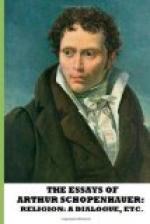Testaments had to be combined. The great allegory
was of gradual growth. Suggested by external
and adventitious circumstances, it was developed by
the interpretation put upon them, an interpretation
in quiet touch with certain deep-lying truths only
half realized. The allegory was finally completed
by Augustine, who penetrated deepest into its meaning,
and so was able to conceive it as a systematic whole
and supply its defects. Hence the Augustinian
doctrine, confirmed by Luther, is the complete form
of Christianity; and the Protestants of to-day, who
take Revelation sensu proprio and confine it
to a single individual, are in error in looking upon
the first beginnings of Christianity as its most perfect
expression. But the bad thing about all religions
is that, instead of being able to confess their allegorical
nature, they have to conceal it; accordingly, they
parade their doctrine in all seriousness as true sensu
proprio, and as absurdities form an essential part
of these doctrines, you have the great mischief of
a continual fraud. And, what is worse, the day
arrives when they are no longer true sensu proprio,
and then there is an end of them; so that, in that
respect, it would be better to admit their allegorical
nature at once. But the difficulty is to teach
the multitude that something can be both true and
untrue at the same time. And as all religions
are in a greater or less degree of this nature, we
must recognize the fact that mankind cannot get on
without a certain amount of absurdity, that absurdity
is an element in its existence, and illusion indispensable;
as indeed other aspects of life testify. I have
said that the combination of the Old Testament with
the New gives rise to absurdities. Among the examples
which illustrate what I mean, I may cite the Christian
doctrine of Predestination and Grace, as formulated
by Augustine and adopted from him by Luther; according
to which one man is endowed with grace and another
is not. Grace, then, comes to be a privilege received
at birth and brought ready into the world; a privilege,
too, in a matter second to none in importance.
What is obnoxious and absurd in this doctrine may
be traced to the idea contained in the Old Testament,
that man is the creation of an external will, which
called him into existence out of nothing. It
is quite true that genuine moral excellence is really
innate; but the meaning of the Christian doctrine is
expressed in another and more rational way by the
theory of metempsychosis, common to Brahmans and Buddhists.
According to this theory, the qualities which distinguish
one man from another are received at birth, are brought,
that is to say, from another world and a former life;
these qualities are not an external gift of grace,
but are the fruits of the acts committed in that other
world. But Augustine’s dogma of Predestination
is connected with another dogma, namely, that the mass
of humanity is corrupt and doomed to eternal damnation,




